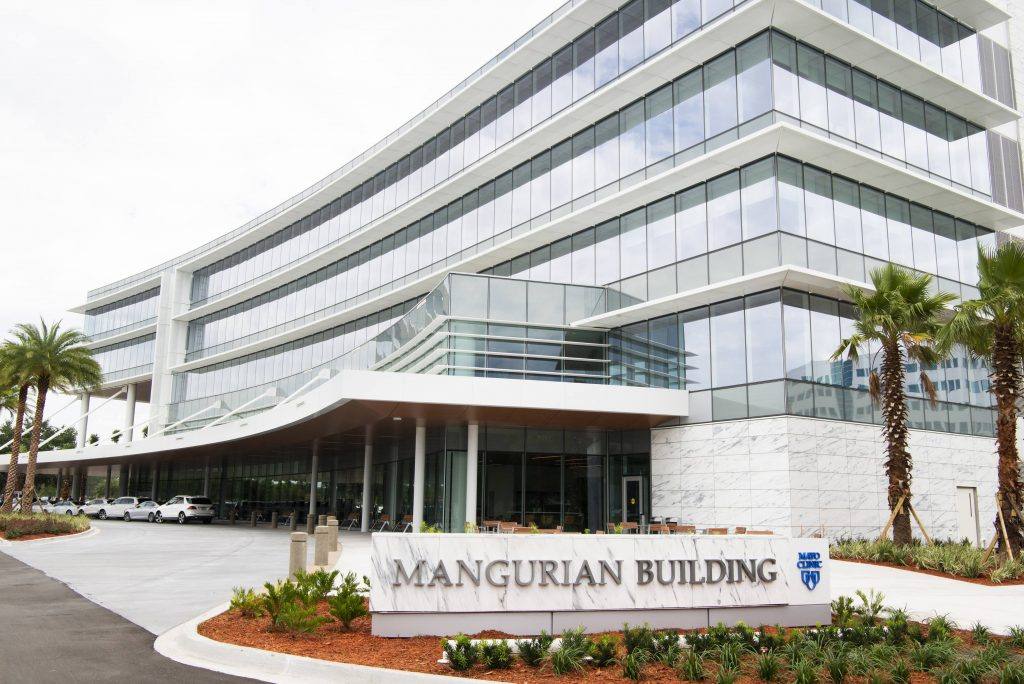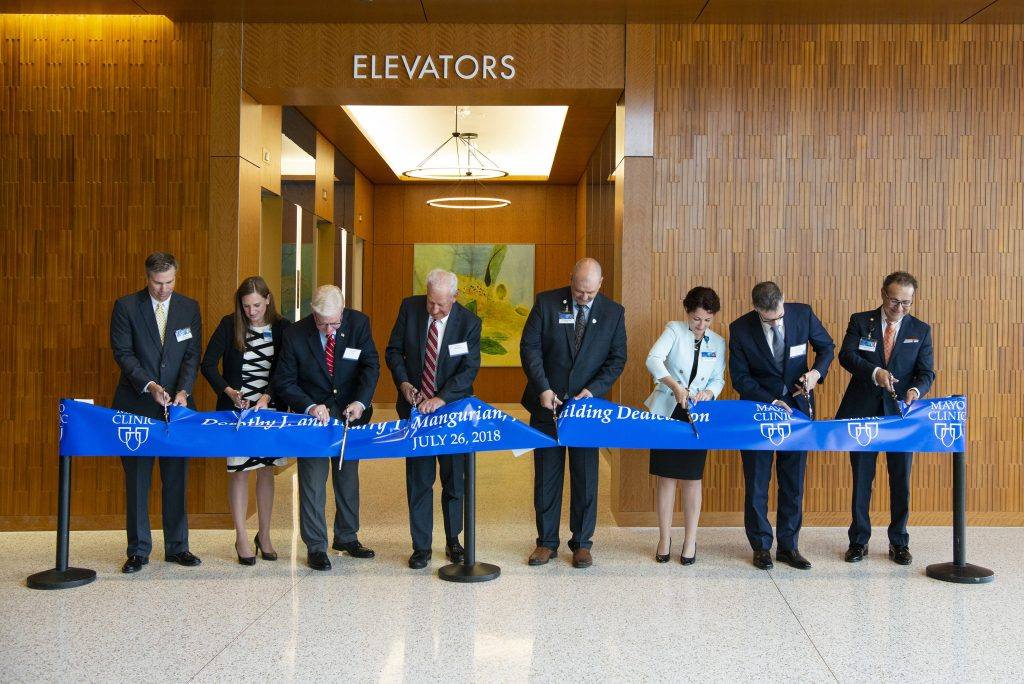-
Mayo Clinic opens new building for cancer, neurology patients

JACKSONVILLE, Fla.— Mayo Clinic’s new 190,000-square-foot medical building on its Florida campus will open on Monday, Aug. 6, for patients seeking cancer, neurology and neurosurgical care. Named in honor of benefactors Harry T. Mangurian and his wife, Dorothy Mangurian, the Dorothy J. and Harry T. Mangurian Jr. Building is part of a $350 million investment to continue to develop Mayo Clinic’s Florida campus as the premier medical destination in the Southeast.
"The Mangurian Building is a key component as Mayo Clinic builds out our future in Florida as a destination medical center," says Gianrico Farrugia, M.D., vice president, Mayo Clinic, and CEO of Mayo Clinic in Florida. “The attention to detail and new design features will enhance the experience of our patients and their families, while hard-wiring innovation into diagnosis and treatment.”
Mayo Clinic received a $20 million gift from the Harry T. Mangurian Jr. Foundation based in Fort Lauderdale, Florida, to support the new medical building for cancer, neurology and neurosurgical services.
In addition to providing integrated services for complex cancer, neurologic and neurosurgical care, the building will be home for discovery, patient-centered research and clinical trials. Initially rising five stories, the building has the potential for seven more stories.
The building is surrounded on the outside by beautiful white-and-gray marble quarried from Vermont. In a corner in the second floor waiting area, there is a wall made of Brazilian blue stone associated with healing properties. In front of the wall is a bell that patients can ring to celebrate the completion of their entire chemotherapy treatment. Every aspect of the building is designed for patient comfort, serenity and privacy.
Features of the new building include:
- Two floors devoted to hematology and oncology care
The new space more than doubles the size of the Hematology and Oncology Department. This size increase will be complemented by a 50 percent increase in staff. The number of clinical trials and immunotherapies also will increase. - Oncology Infusion Center
This area has 43 large private suites, doubling capacity. Also, there will be space for family members, a dedicated nourishment area and a patient library. Chemotherapy chairs recline, and can provide heat and massage. - One floor devoted to neurology and neurosurgery
The building doubles the space for the Neurology and Neurosurgery departments, allowing the hiring of more neurologists and neurosurgeons. The area includes space to support gait testing for various neurological conditions, including movement disorders and stroke. - Leading technology
The building will hold a first for Florida: a 7-Tesla MRI scanner with higher-resolution to image the head and the extremities. The scanner has such detail to pinpoint the smallest of defects, in some cases causing seizures, which neurosurgeons can more easily locate and treat. - Patient care enhancements
Patient care enhancements include an outdoor garden, meeting space for support groups and a bistro that offers dietary options tailored to specific diseases. In addition, scalp cooling therapy will be offered to help patients prevent hair loss during treatment. The cap is custom-fitted to circulate liquid at about 32 degrees Fahrenheit and constrict blood vessels in the scalp to block chemotherapy drugs. As a result, hair is protected and continues to grow. - Education enhancements
The building includes space designed specifically for Mayo Clinic’s educational efforts, and the training of residents and fellows. - Research
The building will have space to conduct basic science research and deliver early therapeutics and clinical trials. Mayo Clinic’s Florida campus is now home to one of the largest NIH-funded neuro-oncology clinical and research group in the country.
“We’re proud that this building will help us put our arms around patients and help us envelop them in our expertise, in comfort, and in support,” Dr. Farrugia says. “We know that this building will allow us to do what Mayo Clinic does best, which is to offer unparalleled, highly complex diagnostic and treatment options, and hope and healing.”
Over the past two years, Mayo Clinic's Florida campus has flourished with major construction and new staff to serve a fast-growing patient population, especially those who require complex medical care. During this time, Mayo Clinic has invested more than $350 million in construction projects and added more than 1,000 new staff. Over the next five years, Mayo Clinic will continue to add staff to support the new Mangurian Building and embark on other major expansion projects. Mayo’s Florida campus has more than 6,000 staff members and contributes nearly $2 billion annually to the Florida economy.

Generosity of the Mangurians
The naming of the building unites key aspects of the Mangurians' life stories. Harry Mangurian died of leukemia in 2008. Dorothy Mangurian was diagnosed with Lewy body dementia, a neurological condition that can have features of Parkinson’s and Alzheimer’s diseases. She passed away in 2015.
Previous gifts from the Mangurian Foundation have helped Mayo researchers advance the study of Lewy body dementia, a deadly disease that causes a progressive decline in mental and physical abilities. A gift of $5.75 million in 2015 created the Mayo Clinic Dorothy J. and Harry T. Mangurian Jr. Lewy Body Dementia Program. It also supported the brain bank on the Florida campus, which includes about 1,000 donated organs of deceased patients confirmed to have had Lewy body dementia.
The Mangurian gifts also have contributed to a first-ever genomewide association study that found new genetic risk factors for Lewy body dementia. Mayo Clinic researchers recently discovered a Lewy body dementia gene that runs in some families. They also identified a severe sleep disorder, in which patients act out their dreams, as a significant predictor of the disease 10 to 20 years in advance of other symptoms.
In total, the Mangurian Foundation has committed nearly $27 million to Mayo Clinic.
The late Harry T. Mangurian Jr. was a developer in Fort Lauderdale and Rochester, New York. He owned the NBA’s Boston Celtics and was an influential leader in thoroughbred horse racing, maintaining a breeding farm in Ocala, Florida.
###
About Mayo Clinic
Mayo Clinic is a nonprofit organization committed to clinical practice, education and research, providing expert, comprehensive care to everyone who needs healing. Learn more about Mayo Clinic. Visit the Mayo Clinic News Network.
Media contact:
- Kevin Punsky, Mayo Clinic Public Affairs, 904-953-0746, newsbureau@mayo.edu







